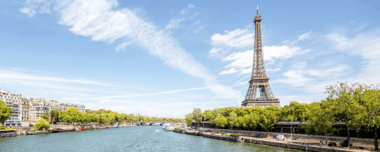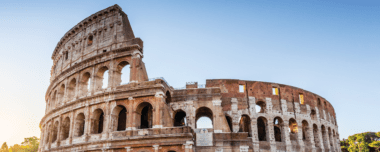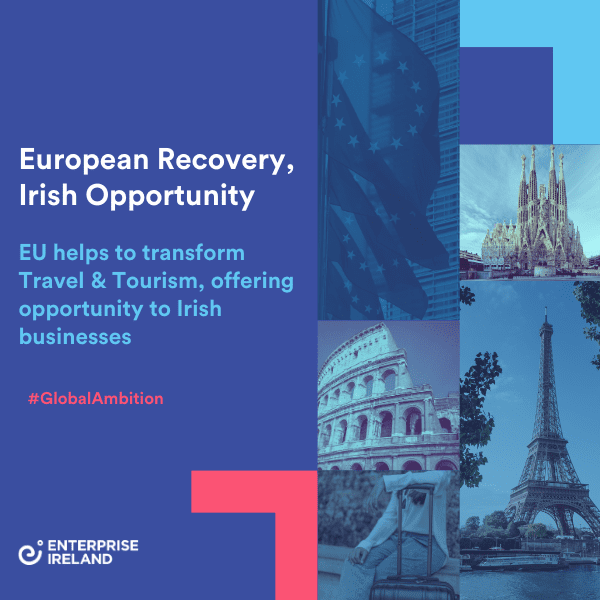Summary
- NextGenerationEUrepresents an opportunity for Irish companies to break into new markets or scale their presence in existing markets
- EU member states are striving to transform their travel and tourism sectors around the twin pillars of digitalisation and sustainability, with thousands of projects in train or set to be completed by 2026.
- The Enterprise Ireland Eurozone teamcan help you find the right travel and tourism digitalisation projects to target
Tourism is on the way back. While the pandemic severely disrupted the travel and tourism sector, every region saw increases in travel in 2022, according to the World Tourism Organization (UNWTO).
In fact, more than 900 million tourists travelled internationally in 2022. While this was twice as many as in 2021, it was just 63% of pre-pandemic levels. Europe fared better than most other regions, however, with numbers returning to close to 80% of 2019 figures.
Hotels, hospitality providers, travel agencies, transport companies, tour operators and activity providers can be reasonably confident of seeing improved revenues again in 2023. This is despite and in ways subject to macroeconomic challenges such as inflation and the war in Ukraine.
Broadly speaking, the industry in Europe continues to offer substantial opportunity to Irish travel tech companies. And with substantial funding flowing across the region from the €806.9 billion NextGenerationEU recovery and resilience programme, there is unprecedented
How digital tools are transforming tourism
Across the travel and tourism industry in Europe, digital solutions are making the industry more efficient and more cost-effective, while also smoothing the journey for consumers.
In the accommodation sector, for example, accommodation providers across all price levels are increasingly using digital technologies to enrich and improve their offer. This includes innovations such as:
- Mobile or remote payment
- Online or mobile check-in
- Virtual assistance using chatbots
- Virtual tours
- Virtual keys (on smartphones).
Likewise, the cultural sector is also taking more advantage of digital tools. In this space, these can include:
- online ticketing
- on-site QR codes, beacons and touch screens
- attraction-specific apps
- interactive and virtual reality installations.
Furthermore, the pandemic also led to an increase in offerings such as virtual visits to museums or other attractions, online lessons (such as cooking lessons) and experiences, or dedicated e-commerce platforms for food, wine and crafts.
Real potential across the value chain
Across every aspect of the travel and tourism experience, from research and booking, to how people get around to their stay and what they do on their trip, there are opportunities for specialist travel tech providers to improve the experience for both the traveller and the service provider.
The opportunity is broader than specific travel tech solutions, however. Fintech, cybersecurity, and data analytics and protection firms, for example, may find valuable opportunities in this sector.
Opportunity abounds around sustainability
Under pressure from government as well as from the consumers they service, travel and tourism companies are increasingly committed to sustainability. This can include:
- reducing energy consumption
- cutting carbon emissions
- reducing waste
- sourcing local providers of goods and services.
In terms of the offer to travellers, sustainability comes to the fore in the shape of eco-tourism, slow tourism, cultural exchange, community development and environmental protection.
Other avenues to sustainability include newer trends that help to reduce overtourism and increase bookings in the low season, such as appealing to digital nomads and promoting long stay holidays, both of which are significant factors in Italy and Spain.
Irish companies thriving in tourism
While Ireland has long excelled as a tourist destination, it’s also home to an increasingly vibrant travel tech sector.
Irish companies succeeding across Europe in the sector include Campsited, a booking platform for campsites and outdoor activities, car rental and mobility solutions provider CarTrawler and biometric travel security specialists Daon.
Expert advisors in Enterprise Ireland’s network of offices across Europe, together with its Market Research Centre in Dublin can support your business as it investigates market opportunities, including making local introductions and helping you to build your network.
Market snapshots
France
A tech savvy-market with substantial public funding for transformation, France offers opportunities to any company with a distinctive offering.

Italy
Developing a local approach is key to unlocking the digital transformation potential of this large but still fragmented market.

Spain
A world leader in tourism, Spain is pushing hard to see more innovation and digitalisation across all levels of this vital sector.




